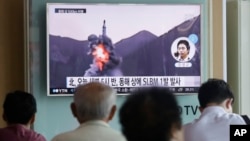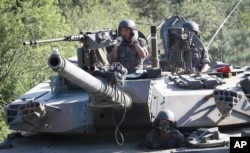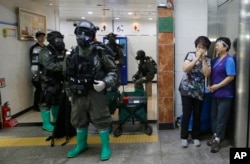North Korea has launched a ballistic missile from a submarine off its east coast, South Korean defense officials said in a statement.
The missile, launched about 5:50 a.m. local time Wednesday (2050 UTC Tuesday), flew about 500 kilometers, South Korea's military said. The statement said it wasn't immediately known if the launch was successful.
U.S. Strategic Command (USSTRATCOM) said the launch of "a presumed KN-11 submarine launched ballistic missile" occurred off the coast of Sinpo.
"We strongly condemn this and North Korea's other recent missile tests, which violate U.N. Security Council resolutions explicitly prohibiting North Korea's launches using ballistic missile technology," said a statement by the U.S. agency.
Earlier Tuesday, the United Nations Command said North Korea has been laying new landmines on its side of its heavily fortified border with South Korea.
North Korean soldiers have been spotted planting anti-personnel mines on its side of the so-called Bridge of No Return, a river crossing near the border truce village of Panmunjom.
The U.N. Command, which oversees the cease-fire that ended the 1950-53 Korean War, condemned Pyongyang in a statement released Tuesday, saying it "seriously jeopardizes the safety of people on both sides" of the Demilitarized Zone.
North Korea has been blamed for planting landmines along the DMZ that detonated last year, maiming two South Korean soldiers patrolling the border.
The U.S.-led command would not speculate on why North Korea is taking such action, but South Korea's Yonhap news agency said it was told by a government source that the mines are there to prevent front-line North Korean troops from defecting.
Escalating tensions
The launch comes at a time of escalating tensions between the two countries and a day after South Korea and the United States began their annual joint military exercises. About 25,000 U.S. forces and 50,000 South Korean troops are involved in the two-week Operation Ulchi Freedom exercise, which is largely simulated.
North Korea threatened military retaliation. A statement issued Monday by the North's military said its first-strike units were ready to turn the United States and Washington "into a heap of ashes through a Korean-style preemptive nuclear strike," if North Korea's sovereignty is threatened.
Both South Korea and the U.S. insist the exercises are purely defensive in nature.
Tensions on the Korean peninsula have worsened in recent months, with North Korea enduring harsh U.N. sanctions over a series of tests of its nuclear weapons and ballistic missiles.
Relations are also aggravated by the recent defection of a high-ranking diplomat, Thae Yong Ho, Pyongyang's deputy ambassador to Britain.
South Korean President Park Guen-hye told her National Security Council on Monday that Thae's defection was a sign of "serious cracks" in North Korea's ruling structure.
North and South Korea technically remain in a state of war dating from the 1950-'53 civil war that ended with a truce rather than a peace treaty.








